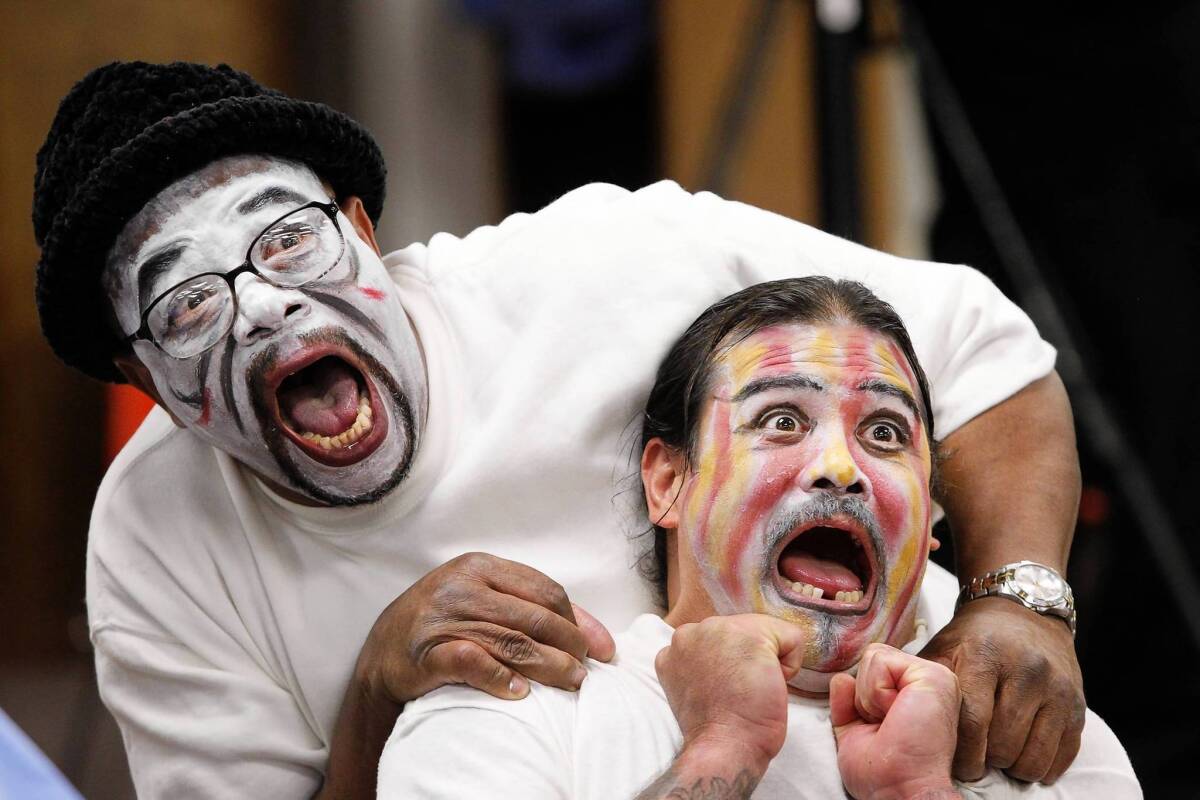Acting program allows inmates to open up emotionally

- Share via
They milled around the room aimlessly, their faces painted — some ghost white, others in different colors like a tribal mask — and they followed the instructions: They glided when they were told to walk as if they were filled with air, then slowed to a deliberate shuffle when told to act like they’d been shackled.
“How does that feel?” said their instructor, Sabra Williams, of the Actors’ Gang. “What emotions does that trigger?”
The group of about a dozen were grown men, prisoners at the California Rehabilitation Center in Norco, a place where they don’t typically let themselves be seen acting foolishly or displaying the kind of emotion that could make them seem vulnerable.
And that was exactly the point.
PHOTOS: Inmates express themselves through acting
The men had gone through the Actors’ Gang’s Prison Project not just to learn the craft of acting, but to take part in what its organizers believed was a rehabilitation that would encourage them to express themselves and explore their emotions through acting exercises.
“People are opened to a new awareness of who they are and who they can be through the arts,” said Alma Robinson, executive director of California Lawyers for the Arts, which helps organize the program.
On Tuesday, the men performed on the prison grounds before fellow inmates they’d invited as well as outside visitors. The classroom had become a safe place for them, where they could let their guard down. They could show fear, be empathetic toward others or skip about with a childish grin.
The performance was a chance — for some, their first — to stand before others without having to put on a stoic face.
It was the culmination of eight weeks of work in which they learned the series of improvisational exercises they would demonstrate before the crowd. There was no script and little dialogue. Instead, they had to work quickly on their feet. The instructors also pushed them to focus on their eyes, using them to convey emotion, and to make eye contact with members of the audience.
Ronnie, one of the performers taking part for his second time, had his face painted white and had the expressions of a mime. A broad smile frequently flashed across his face and he’d break into impish laughter. In one exercise, he yanked up the waist of his prison-issued dark blue pants and acted like a baby, crying in a shrill whine and acting disgusted when pretending to eat a lollipop that tasted like pickles.
The other inmates in the room laughed along.
He said he wasn’t afraid of their reaction. “They have it in them too,” he said.
Another of the participants, Garry, said after the show that he’d come to embrace his quirkiness, even in front of a crowd. “It makes your whole body feel at ease,” he said. (Corrections officials would allow inmates to be identified only by their first name.)
Tim Robbins, the actor and a co-founder of the Actors’ Gang, played a beat on a set of drums to accompany the men as they performed. He said that these men — like the others who’ve participated in the program that began in 2006 — had gone through a noticeable transformation as they became more comfortable with performing and, really, more comfortable with themselves.
“You can really feel the weight of their incarceration,” he said of when they first began. “There’s a reluctance, a lack of lightness, a lack of the kind of spirit that does emerge.”
PHOTOS: Inmates express themselves through acting
At the end, the men came forward to talk a little about themselves. One of them served in the Marines, including a tour in Iraq, before he was incarcerated. Another spoke of a descent spurred by drug abuse and how he had become a devout Christian. One man said he’d always loved the movies, saving up to go to the theaters in downtown Los Angeles as a kid to see as many pictures as he could; now he was studying television production through correspondence classes and wanted to go into show business.
They told the audience where they planned to be in a decade: Some had plans of going to school to study physics or geology, of opening businesses and having children and grandchildren. One said he wanted to be a gardener, mowing lawns. He said he had promised his wife that he’d make it happen.
The program, they said, gave them an opportunity to boost their confidence.
“Who we really are is who we showed you today,” Ronnie said. “Those characters are within us.”
More to Read
Sign up for Essential California
The most important California stories and recommendations in your inbox every morning.
You may occasionally receive promotional content from the Los Angeles Times.










